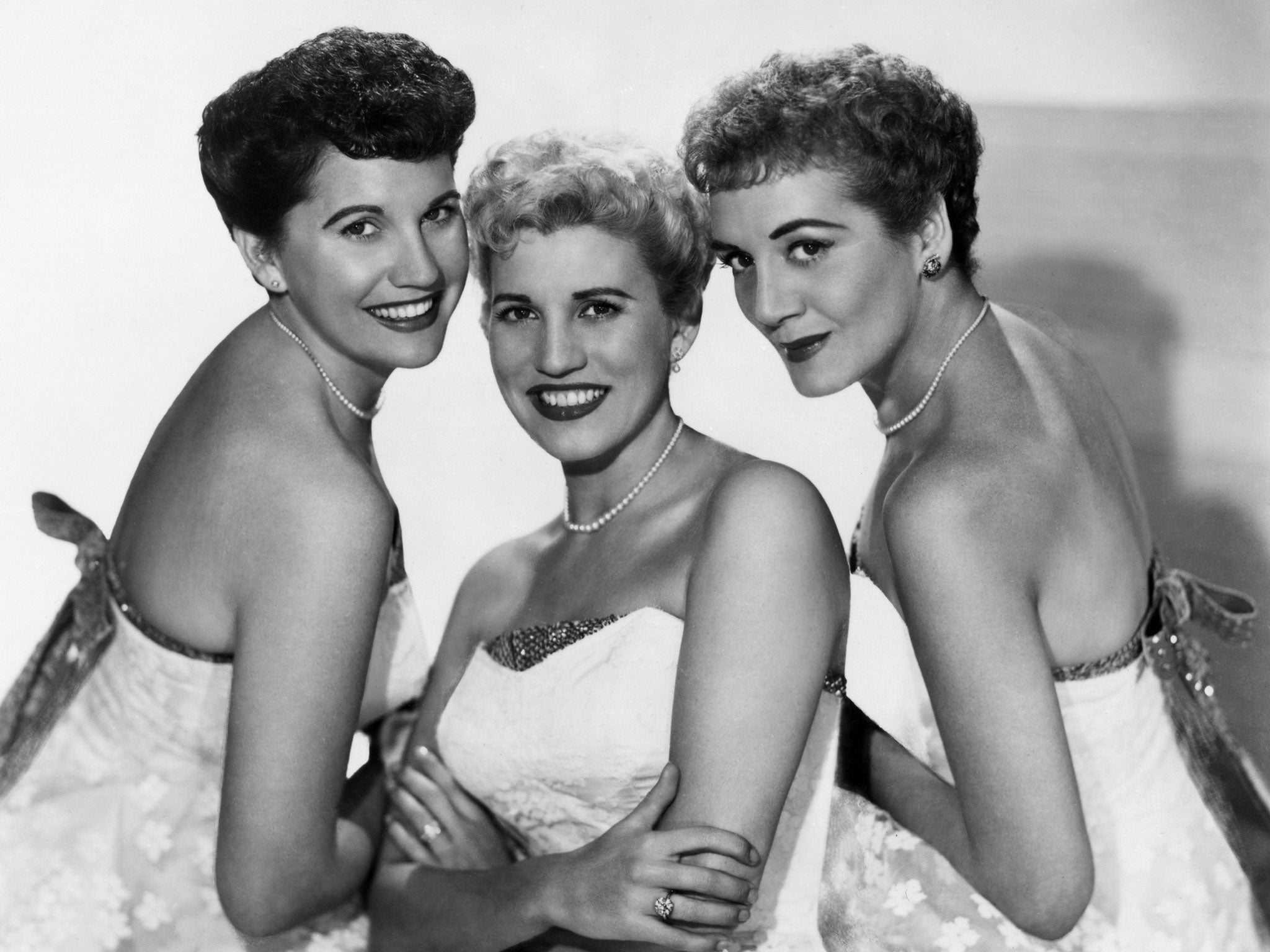
Your support helps us to tell the story
This election is still a dead heat, according to most polls. In a fight with such wafer-thin margins, we need reporters on the ground talking to the people Trump and Harris are courting. Your support allows us to keep sending journalists to the story.
The Independent is trusted by 27 million Americans from across the entire political spectrum every month. Unlike many other quality news outlets, we choose not to lock you out of our reporting and analysis with paywalls. But quality journalism must still be paid for.
Help us keep bring these critical stories to light. Your support makes all the difference.
The Andrews Sisters were the American equivalent of Vera Lynn with the British troops in wartime. They boosted morale, sold war bonds and were the forces' sweethearts who made GIs reminisce about life back home. They sold 50 million records, which included "Boogie Woogie Bugle Boy", "Beat Me Daddy Eight To The Bar" and "Don't Sit Under The Apple Tree".
Without undermining Maxene and Laverne's contributions, Patty was the focal point, the blonde in the middle who sang lead and was a versatile comedienne. The Andrews Sisters are the most popular sister act of all time, but fame came with a price as they fell out with each other. They rarely discussed their differences, feeling that it would destroy their public image.
Patty Andrews was born in Mound, Minnesota in 1918. Her father, Peter, was a Greek immigrant who had changed the family name from Andreos to Andrews, while her mother, Olga, was Norwegian. They encouraged the musical abilities of all three daughters, with Patty becoming a champion tap dancer around Minneapolis.
In the early 1930s the family would listen to The Camel Cigarette Program with Bing Crosby and a southern trio, the Boswell Sisters. They copied the Boswells' harmonies and in 1932 with Laverne 21, Maxene 16 and Patty 14, they started to perform professionally. They toured with the Larry Rich Troupe and then worked with Ted Mack's orchestra.
They sang with the Leon Belasco Orchestra at the Mayfair Hotel in Kansas City but the hotel burned down, destroying their wardrobe and the band's instruments and scores. Belasco returned with Vic Schoen, who wrote new arrangements with less sophistication and more swing for the girls and thereby created their sound.
In 1937 Peter Andrews gave them three months to find success in New York or else take secretarial jobs. Fortunately, Schoen secured a radio performance for them from the Edison Hotel. An executive for US Decca was impressed and invited them to record four sides for $50 apiece. One song, "Bei Mir Bist Du Schön (Means That You're Grand)", was a Yiddish folk tune with a new lyric from the up-and-coming Sammy Cahn. It became the group's first million-seller.
In 1940 the Andrews Sisters signed with Universal and were featured in a dozen films, mostly singing but also acting. In Buck Privates with Abbott and Costello they performed two songs that would become associated with them; the sentimental "I'll Be With You In Apple Blossom Time" and the Oscar-nominated "Boogie Woogie Bugle Boy". The film implied that the forces were a barrel of laughs, but it was the tonic that troops needed.
In Hollywood Canteen (1944), they sang Cole Porter's "Don't Fence Me In" with Roy Rogers, but recorded it with Bing Crosby; it became of one of their biggest records. Crosby also recorded "Pistol Packin' Mama" (1943) with them and they appeared with him and Bob Hope in The Road To Rio (1947). They often worked with other performers including "The Old Piano Roll Blues" (Al Jolson), "Blue Tail Fly" (Burl Ives) and "The Woody Woodpecker Song" (Danny Kaye). They recorded "Christmas Island" with Guy Lomardo and his Orchestra.
In 1945 the Andrews Sisters were performing for GIs in Italy when the commanding officer came on stage and handed Patty a note. She announced that the war was over and always regarded the response as their greatest ovation.
They had problems with the BBC which banned their calypso "Rum And Coca-Cola" (1945) on grounds of advertising. Local acts beat the ban by singing "Rum And Li-mon-Na-Da". "Rum And Coca-Cola" became the second biggest-selling seller of the 1940s, outsold only by Bing Crosby's "White Christmas". In January 1950 they topped the US charts with "I Can Dream, Can't I".
Patty married the film producer Marty Melcher in 1947 but the marriage only lasted two years, Melcher later marrying Doris Day. In 1951 she married their pianist and conductor, Wally Weschler. He encouraged Patty to turn solo, which led to lawsuits when they split in 1953, as Maxene and Laverne felt their earnings had been compromised.
They reunited in 1956, though Laverne died from cancer in 1967 and Patty continued on her own. In 1973 Bette Midler revived "Boogie Woogie Bugle Boy" and created new interest in the group. In 1974 Patty and Maxene worked in the Broadway musical, Over Here!, but the show folded within a year. Although they lived close to each other in San Fernando Valley, they remained apart; they were briefly reunited when Maxene suffered a heart attack in 1982 and five years later they unveiled their star on the Hollywood Walk of Fame. Maxene died in 1995 when they were still estranged. Patty toured the UK in 1990 as guest vocalist with the Glenn Miller Orchestra.
Spencer Leigh
Patricia Marie Andrews, singer: born Mound, Minnesota 16 February 1918; married 1947 Marty Melcher (divorced 1949), 1951 Wally Weschler (died 2010); died Northridge, Los Angeles 30 January 2013.
Subscribe to Independent Premium to bookmark this article
Want to bookmark your favourite articles and stories to read or reference later? Start your Independent Premium subscription today.
Join our commenting forum
Join thought-provoking conversations, follow other Independent readers and see their replies
Comments